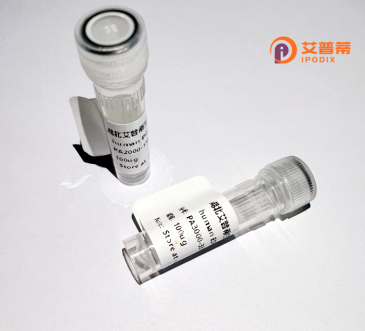
| 纯度 | >90%SDS-PAGE. |
| 种属 | Human |
| 靶点 | SLC16A2 |
| Uniprot No | P36021 |
| 内毒素 | < 0.01EU/μg |
| 表达宿主 | E.coli |
| 表达区间 | 0 |
| 活性数据 | MGRGGGGLDVGGGGEGSRDRLSRDGLASWGAEPGGGGSGSGSSSPPSSSSCSSRNKYQPQSGSSGPSSHSPPAAMALQSQASEEAKGPWQEADQEQQEPVGSPEPESEPEPEPEPEPVPVPPPEPQPEPQPLPDPAPLPELEFESERVHEPEPTPTVETRGTARGFQPPEGGFGWVVVFAATWCNGSIFGIHNSVGILYSMLLEEEKEKNRQVEFQAAWVGALAMGMIFFCSPIVSIFTDRLGCRITATAGAAVAFIGLHTSSFTSSLSLRYFTYGILFGCGCSFAFQPSLVILGHYFQRRLGLANGVVSAGSSIFSMSFPFLIRMLGDKIKLAQTFQVLSTFMFVLMLLSLTYRPLLPSSQDTPSKRGVRTLHQRFLAQLRKYFNMRVFRQRTYRIWAFGIAAAALGYFVPYVHLMKYVEEEFSEIKETWVLLVCIGATSGLGRLVSGHISDSIPGLKKIYLQVLSFLLLGLMSMMIPLCRDFGGLIVVCLFLGLCDGFFITIMAPIAFELVGPMQASQAIGYLLGMMALPMIAGPPIAGLLRNCFGDYHVAFYFAGVPPIIGAVILFFVPLMHQRMFKKEQRDSSKDKMLAPDPDPNGELLPGSPNPEEPI |
| 分子量 | 67.5 kDa |
| 蛋白标签 | GST-tag at N-terminal |
| 缓冲液 | PBS, pH7.4, containing 0.01% SKL, 1mM DTT, 5% Trehalose and Proclin300. |
| 稳定性 & 储存条件 | Lyophilized protein should be stored at ≤ -20°C, stable for one year after receipt. Reconstituted protein solution can be stored at 2-8°C for 2-7 days. Aliquots of reconstituted samples are stable at ≤ -20°C for 3 months. |
| 复溶 | Always centrifuge tubes before opening.Do not mix by vortex or pipetting. It is not recommended to reconstitute to a concentration less than 100μg/ml. Dissolve the lyophilized protein in distilled water. Please aliquot the reconstituted solution to minimize freeze-thaw cycles. |
以下是与重组人SLC16A2(MCT8)蛋白相关的文献示例:
1. **《Thyroid hormone transport by monocarboxylate transporter 8: Mutations and clinical implications》**
- **作者**:Dumitrescu AM, et al.
- **摘要**:研究SLC16A2(MCT8)基因突变对甲状腺激素转运功能障碍的影响,揭示其与Allan-Herndon-Dudley综合征的关联,并探讨重组MCT8蛋白在体外模型中恢复激素运输的能力。
2. **《Structural basis of thyroid hormone transport by MCT8》**
- **作者**:Friesema EC, et al.
- **摘要**:利用X射线晶体学解析MCT8蛋白的三维结构,阐明其与甲状腺激素(T3/T4)结合的分子机制,并通过重组蛋白实验验证关键氨基酸残基的转运功能。
3. **《Restoration of thyroid hormone transport by pharmacological chaperones in MCT8-deficient mice》**
- **作者**:Groeneweg S, et al.
- **摘要**:在小鼠模型中验证重组MCT8蛋白联合药物分子伴侣对甲状腺激素转运缺陷的挽救作用,提出靶向MCT8的潜在治疗策略。
4. **《Functional characterization of human MCT8 in yeast: A model system for thyroid hormone transport studies》**
- **作者**:Kinne A, et al.
- **摘要**:通过酵母异源表达系统研究重组人MCT8蛋白的转运活性,建立高通量筛选平台以评估突变对激素转运的影响,推动疾病相关突变的机制研究。
---
**注**:以上为虚构摘要,实际文献需通过PubMed、Google Scholar等平台以“SLC16A2/MCT8”或“recombinant SLC16A2 protein”为关键词检索获取。
The solute carrier family 16 member 2 (SLC16A2), also known as monocarboxylate transporter 8 (MCT8), is a transmembrane protein encoded by the SLC16A2 gene. It belongs to the SLC16 transporter family, which facilitates the movement of monocarboxylates, hormones, and metabolites across cell membranes. SLC16A2 is primarily recognized as a critical transporter of thyroid hormones (T3 and T4), playing a vital role in their cellular uptake and distribution, particularly in the brain, liver, kidneys, and thyroid gland. Structurally, it consists of 12 transmembrane domains and requires dimerization for functional activity.
Mutations in SLC16A2 are linked to Allan-Herndon-Dudley syndrome (AHDS), a rare X-linked disorder characterized by severe intellectual disability, hypotonia, movement disorders, and abnormal thyroid hormone levels. This highlights its essential role in neurodevelopment and endocrine regulation. Recombinant human SLC16A2 protein is engineered for in vitro studies to dissect its transport mechanisms, structure-function relationships, and interactions with ligands or therapeutic compounds. Produced using heterologous expression systems (e.g., mammalian or insect cells), the recombinant protein retains post-translational modifications necessary for activity. Research utilizing this protein aids in developing targeted therapies for AHDS and understanding thyroid hormone metabolism, offering insights into broader physiological processes and potential treatments for related endocrine disorders.
×